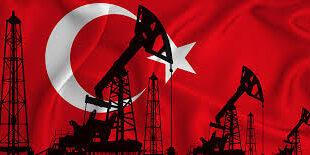Saudi Arabia’s carefully nurtured reputation for being a reliable oil producer and its aspiration to be seen as a responsible global leader will be in jeopardy if the kingdom continues to pursue its volume war.
Pressing on with such a tactic in the midst of the worst global health emergency since the influenza pandemic of 1918 and one of the deepest global economic downturns in a century would be supremely dangerous.
Context matters. Sometimes the environment in which a policy was conceived and initially executed changes so radically that it is no longer appropriate and must be changed. This is one of those times.
Calling a truce is the responsible course for Saudi policymakers.
GOING TO WAR
Launching the volume war was an understandable if controversial response to the loss of market share to U.S. shale over the last decade and failure to reach agreement on deeper production limits with Russia.
Once Saudi Arabia and Russia failed to agree a response to the market-share loss, the kingdom switched from seeking deeper and longer production cuts to flooding the market with surplus crude.
In effect, Saudi Arabia’s strategy switched to “punishment mode”, with a series of announced output rises, inventory withdrawals and capacity increases intended to inflict maximum pain.
The kingdom’s shock and awe tactics seem to have been designed to force an early resumption of negotiations (“Saudi Arabia tries shock tactics to bring oil war to swift end”, Reuters, March 10).
Brent prices tumbled from $50 per barrel to around $35 in the week following the kingdom’s announcement it would raise oil supplies by more than 2 million barrels per day in April and May.
INTO RECESSION
Since then, however, the volume war has been overtaken by a worsening of the pandemic and the proliferation of travel restrictions and business shutdowns around the world.
The abrupt stop to most activity in some of the world’s largest industries, including passenger airline travel, tourism, entertainment, retail and restaurants, has pushed the global economy into its first recession since 2008/09.
The instantaneous loss in global oil consumption is easily in the order of 10 million barrels per day, up from perhaps 1 million barrels per day at the start of the month.
For example, transatlantic aviation alone accounts for roughly 1 million bpd of oil consumption. The U.S. domestic gasoline market is almost 10 million barrels per day.
Plausible assumptions about the downturn in transportation and business activity across North America and Western Europe over the last two weeks suggest instantaneous losses of 10 million bpd are reasonable.
The sudden stop in global consumption is what has pushed Brent prices down a further $10 per barrel since the start of this week.
Brent’s six-month calendar spread has collapsed into a contango of $8 per barrel, indicating traders anticipate an enormous build-up in oil inventories that will fill all available storage within the next few months.
MAXIMUM STRESS
The oil market, which was saturated by the volume war, is now set to be super-saturated by global recession, with oil prices and spreads trading at levels that are symptomatic of acute distress.
In these changed circumstances, pressing ahead with the volume war is the not the action of a responsible global supplier, which has often been likened to a central bank for the oil market.
Persisting with the volume war is adding to economic and financial instability at a time when the global economy is already under severe strain, and while central banks and governments are trying to calm fears.
Petroleum is one of the world’s largest industries in terms of revenues, investment, high-paid employment and supply-chain impact. Maximizing the disruption of the industry at this time is not sensible.
DECLARE VICTORY
The onset of a deep and synchronized global recession has already increased the oil market surplus (10 million bpd) by much more than the volume war (2-3 million bpd).
Consumption losses and low prices will persist even if Saudi Arabia stops flooding the oil market and reverts to something closer to its pre-OPEC meeting output levels.
Low prices are already forcing an accelerated adjustment by U.S. shale producers and will likely ensure a clear-out of the entire shale industry supply chain.
In the volume war of 2014-2016, U.S. shale producers initially responded with a lot of bravado about being able to withstand the flood of Saudi and OPEC crude.
Shale producers adjusted their drilling programs and output down relatively slowly in the face of a severe and sustained drop in prices.
Arguably, Saudi Arabia and its allies in the expanded OPEC+ group of oil exporting countries were too quick to cut production and try to drive prices higher again in late 2016.
If they had allowed prices to remain lower for longer in 2016/17, they might have achieved a more lasting reduction in supply chain capacity, and moderated the subsequent cyclical upswing in U.S. oil production.
The Declaration of Cooperation and associated output cuts announced in December 2016 were arguably premature, throwing a life line to shale producers and creating conditions for the second shale oil boom.
This time, however, market conditions look different. Shale firms exhibit none of the previous bravado. The industry’s supply chain is much weaker. And capital markets are increasingly closed.
Low prices are already forcing a rapid reduction in drilling plans and the onset of a global recession should ensure that reduction in output materializes.
CALLING A TRUCE
In the current health and economic emergency, the responsible approach is for Saudi Arabia to call a truce in the volume war and cease flooding the market.
That would not send prices back to pre-OPEC meeting levels since the consumption environment has deteriorated. Nor would it rescue U.S. shale firms, other members of OPEC or other oil producers.
But it would help moderate the extreme instability in energy and financial markets at present and it would be a contribution to helping fight the pandemic and avoid a global economic depression.
The truce can be temporary. If Saudi Arabia remains concerned about the output of rival producers, there will be an opportunity to revert to a volume war when the pandemic is under control and the economy is stabilized.
In the meantime, the kingdom’s policymakers should seize this opportunity to show real global leadership and claim the credit for acting in the interests of the economy and the industry as a whole.
If they need diplomatic cover to be able to execute a change in strategy, the White House may be able to provide it by emphasizing the importance of stabilizing the oil market.
In any event, as the global health-oil-economic crisis intensifies, it is likely the U.S. government will put pressure on the kingdom’s leaders to revert to a more conservative production policy.
The White House will not permit the volume war to threaten the survival of the entire U.S. shale sector or its dream of”energy independence”, so political and diplomatic pressure is inevitable.
But the kingdom could reasonably ask the United States to extract at least some confidence-building cooperation from Russia.
Russian cooperation might be forthcoming in exchange for U.S. concessions in other areas, such as Nord Stream 2, and a relaxation of sanctions enforcement.
If the current crisis is not to worsen significantly, top policymakers in Riyadh, Washington and Moscow will all need to show real leadership by modifying their strategies in the face of changed circumstances.

 Iran Energy News Oil, Gas, Petrochemical and Energy Field Specialized Channel
Iran Energy News Oil, Gas, Petrochemical and Energy Field Specialized Channel



